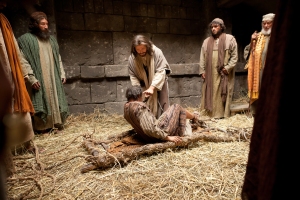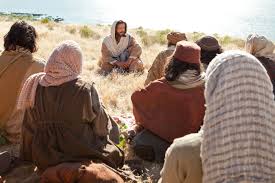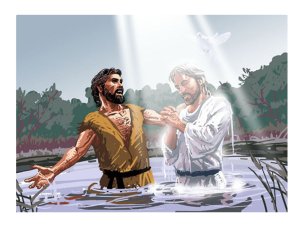The Gospel According to St. Matthew: Matthew Chapter 9: Read Here: https://www.lds.org/scriptures/nt/matt/9?lang=eng
When We Have Faith in Jesus Christ, He Can Heal Us Both Physically and Spiritually
When Jesus returned to His city, some people brought to Him a man who was sick with palsy. Jesus saw their faith—they carried the man across town looking for Jesus—and so He desired to give His blessing.
“Son, be of good cheer; thy sins be forgiven thee” (Matt 9:2).
There were those who were angry that Jesus would say this, thinking that only God can forgive sins, and not acknowledging who Jesus really is!
“Wherefore think ye evil in your hearts? For whether is easier, to say, Thy sins be forgiven thee; or to say, Arise and walk? But that ye may know that the Son of man hath power on earth to forgive sins,” (then saith he to the sick of the palsy,) “Arise, take up thy bed, and go unto thine house” (vs. 4-7).
Further thought: The man stood up and walked home, healed from the effects of both physical and spiritual illness. Indeed the faith needed to procure a blessing of the Lord is the same, whether it is needed so that we can be forgiven of our sins or healed of spiritual ailment. And we should always return thanks to God for His mercy on us. I know that if someone has the faith to “rise up and walk” the Lord can lift him from his bed of affliction and, at the same time, forgive him of his sins.
Jesus, who has the power to heal those who have faith in Him and to raise us from the dead, can forgive us of our sins and make us clean. And those who have enough faith in Him to be healed, also have enough faith to be forgiven.
When Jesus called Matthew, a tax collector, to follow him, Matthew left what he was doing and followed Jesus.
Further thought: Are we willing to put aside our immediate concerns, lucrative vocations, and the cares of the word to hearken to the Lord when He calls us?
The Pharisees judged both Jesus and His disciples for eating with commoners, publicans, and sinners. They thought if He were so great, He should know better with Him He sat at meat. Still they must have felt intimidated about asking Jesus directly, so they questioned His disciples:
“Why eateth your Master with publicans and sinners” (vs. 11)?
Jesus heard and answered for Himself:
“They that be whole need not a physician, but they that are sick. But go ye and learn what that meaneth, I will have mercy, and not sacrifice: for I am not come to call the righteous, but sinners to repentance” (vs. 12-13).
Further thought: We are all sinners, but those who cannot view themselves as such, deny themselves the process of repentance and the gift of the atonement.
John the Baptist’s disciples asked Jesus why his disciples didn’t fast. Jesus’s answer is simply and profound. We really do not fast when we are celebrating with company, a visitor that we looked forward to for many years. Jesus said,
“Can the children of the bridechamber mourn, as long as the bridegroom is with them? But the days will come, when the bridegroom shall be taken from them, and then shall they fast” (vs. 15).
A ruler, whose daughter was already dead, had faith that Jesus could lay His hand upon her and call her back to life. So Jesus and His disciples followed him to go to his daughter. On the way through a crowd, a woman who had a 12-year ailment touched the hem of his garment, having faith that she would be healed by so doing. Jesus spoke to her and said,
“Daughter, be of good comfort; they faith hath made thee whole.”
‘And the woman was made whole from that hour’ (vs. 22).
Further thought: According to the Law of Moses, anyone who had an issue of blood was considered unclean; and anyone who came into physical contact with such a person was to bathe, wash his clothing, and be unclean until the even. But whomsoever Jesus pronounces clean is clean indeed.
Upon reaching the ruler’s house, Jesus told the people,
“Give place: for the maid is not dead, but sleepth.”
‘And they laughed Him to scorn. But when the people were put forth, He went in, and took her by the hand, and the maid arose. And the fame hereof went abroad into all the land’ (vs. 24-26).
After leaving the ruler’s home, two blind men asked Jesus to show them mercy. They called Jesus the Son of David, signifying that they believed in Him as the promised Messiah. Still He asked them,
“Believe ye that I am able to do this?”
‘They responded to Him, “Yea, Lord.”
‘Then touched He their eyes, saying, “According to your faith be it unto you.”
‘And their eyes were opened; and Jesus straitly charged them, saying, “See that no man know it”’ (vs. 28-30).
Further thoughts: Again Jesus commissioned them not to tell. What could be the reason for this? Was it to protect Himself, or keep more crowds from thronging Him? Or was He teaching us to serve anonymously and to follow His example in giving the credit and glory to His Heavenly Father?
Why did the people still spread abroad the news of the miracles anyhow? Could the formerly blind men keep it quiet, when it was obvious that they could now see? Were they questioned? Were the grateful? Did they want others to know Him?
Next He cast a devil out of a dumb man, and then he could speak. Yet the Pharisees weren’t pleased. They said, “He casteth out devils through the prince of the devils” (vs 34). Did they really think Jesus was evil, or did they envy His power and authority?
Jesus continued to go to all the cities and villages.
‘And Jesus went about all the cities and villages, teaching in their synagogues, and preaching the gospel of the kingdom, and healing every sickness and every disease among the people. But when He saw the multitudes, He was moved with compassion on them, because they fainted and were scattered abroad, as sheep having no shepherd. Then saith he unto his disciples,
‘“The harvest truly is plenteous, but the labourers are few; Pray ye therefore the Lord of the harvest, that He will send forth labourers into His Harvest”’ (vs. 35-38).
Even then Jesus was telling the disciples, and preparing them, that they would need to be missionaries and carry the gospel to all people.


